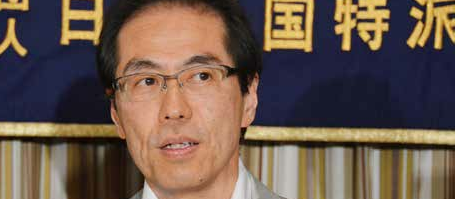Issue:
Former bureaucrat Shigeaki Koga throws light on the cozy relationships between government and the media industry.

SHIGEAKI KOGA WAS ON the fast track at the Ministry of Economy, Trade and Industry until he spectacularly stepped out of line. Watching his press conference at the FCCJ on April 16, one can only wonder why he ever had the notion that he would make a good straight-laced, toe-the-line bureaucrat.
This is a man who appears determined to be the nail that sticks up, and he has long been persona non grata at the ministry since making his opinions on the government's personnel policies quite clear. Now refreshingly he wants to stub the toes of both sides in the growing debate over the government meddling in the media and the fact that large parts of that industry roll over to have their tummies tickled in return.
“I believe very strongly that Japan has a fairly high degree of freedom of expression and freedom of the press,” Koga said. “I also believe that democratic values and democratic systems are fairly well-rooted in Japan.”
And you just knew that a “but” was coming. “Having said that,” he continued, “I am always concerned about what might happen in the future and, even given these freedoms and principles, it is possible that a dictatorship or something approaching a dictatorship could emerge in Japan in the future.”
Koga fears that the first step on that disastrous road would be for the government to build close working relationships with the media, which they have largely done in recent years.
“On the one hand, they can apply pressure, which could be in the form of a threat to take away a broadcaster's license, and on the other they can offer rewards if a media company is cooperative,” Koga said. Yet any media that gives in to pressure so easily or is effectively bribed is not providing much of a service to the public, he believes.
“Another thing that I have seen in recent months that causes me great anxiety is the fact that top executives at the very large mass media companies seem to be coming very close on a personal basis to members of the government,” he said. “They seem to be cozying up to the people in power.
“I think we are very fast reaching a crisis situation in the media.”
“This seems a rather immature way to do business, but some of these executives now feel very proud of themselves and their close ties with members of the government,” he added. “They feel as if they are at the heart of power.”
The problem, of course, is that while the executives are playing golf or having dinner with members of the Cabinet, their journalists might hesitate to ask the tough questions on a story if the answers might ruffle political feathers and, by extension, cause problems for the people who pay their wages. “Unfortunately, we are not seeing the media fight back,” Koga added. “We are basically seeing the media trying to accommodate the pressures and the system of rewards that are being directed their way.”
The third nail in the coffin of a free and fair press, Koga believes, comes when the media is not even aware of the stories they should be chasing. “I think we are very fast reaching a crisis situation in the media,” he said.
Japan has already experienced the application of government pressure and provision of rewards, followed by the media pulling its punches on the sensitive stories. The third step, which is under way, is “frightening,” he said.
After talking to reporters and producers at television companies, Koga realized that the media is “not even aware that it is exercising self- restraint” in what it reports. “This goes to the very heart of what a journalist is,” he said. “The most important ability or function of a journalist is to be aware that something is wrong, that there is an issue, and then to have the courage and ability to follow up and do investigative journalism. I think that ability to be aware of important issues and to follow up on them is being lost.”
And while broadcasters rely on the government for their licenses a system hardly designed to encourage a campaigning and free broadcast media Japanese newspapers and magazines are equally not immune from official pressure. The government is presently re-examining the resale system, under which papers and magazines are sold at a fixed price and cannot be discounted.
Being too vocal in their criticisms of the powers that be might encourage the authorities to abolish the resale system; and not all the newspapers and magazine might survive the subsequent shakeout across the industry.
Inevitably, a public that is not informed of the important issues of the day is not equipped to make informed decisions when elections come around, Koga insists. “The government cannot apply direct pressure to the public, but if the public is not given access to a great deal of information by the media, which is exercising self-restraint, then eventually the information that the public does receive will be the information that is convenient for the people that are in power,” he said. “Without even knowing it, the people are going to be brain-washed,” he added.
That is when the specter of a dictator could hang over Japan, he said.
Julian Ryall is the Japan correspondent for the Daily Telegraph.

